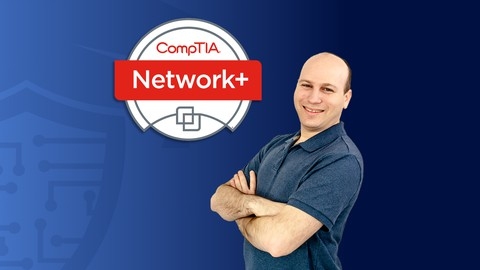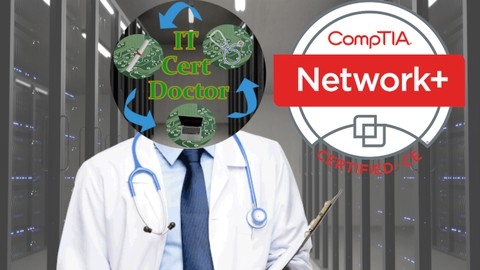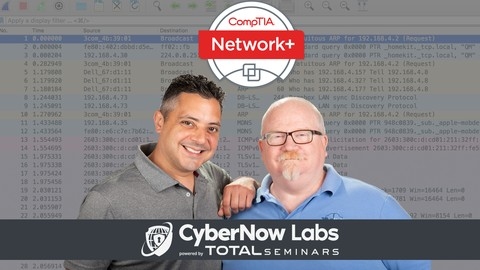CompTIA Network+ is a globally recognized certification that validates your foundational knowledge in computer networking.
It’s a valuable credential for aspiring IT professionals, demonstrating your understanding of network fundamentals, troubleshooting techniques, and security best practices.
By earning your CompTIA Network+ certification, you can open doors to entry-level networking roles, demonstrate your expertise to potential employers, and enhance your career prospects within the IT industry.
Finding the right CompTIA Network+ course on Udemy can be challenging, with countless options available, each promising to guide you to success.
You want a course that’s comprehensive, engaging, and taught by experienced professionals, covering both the theoretical concepts and practical skills needed to master networking.
For the best CompTIA Network+ course overall on Udemy, we recommend CompTIA Network+ (N10-009) Full Course & Practice Exam.
This course stands out due to its thorough coverage of the CompTIA Network+ exam syllabus, including hands-on labs and practice exams to solidify your understanding.
Taught by industry experts Mike Meyers and Joe Ramm, this course ensures you’re well-prepared to tackle the challenges of the certification exam and confidently navigate the world of networking.
While this course is our top pick, it’s only the beginning of your exploration into the realm of CompTIA Network+ courses on Udemy.
There are many other fantastic options tailored to different learning styles, preferences, and budgets.
Keep reading for our complete list of recommendations, where you’ll discover the perfect course to kickstart your journey towards a rewarding career in networking!
CompTIA Network+ (N10-009) Full Course & Practice Exam
This course provides you with a solid foundation in computer networking concepts, technologies, and best practices.
Throughout the course, you will explore the fundamentals of network architecture, including the OSI and TCP/IP models, network topologies, and network geography such as LAN, WAN, MAN, and PAN.
You will learn about various network components, including routers, switches, firewalls, and wireless access points, and understand how they work together to enable communication and data transfer.
The course delves into the intricacies of IP addressing, subnetting, and routing protocols like OSPF and EIGRP.
You will gain hands-on experience with configuring and troubleshooting network devices using command-line tools such as ipconfig, ping, traceroute, and nmap.
As you progress through the course, you will discover the importance of network security and learn about various security technologies, including firewalls, VPNs, IDS/IPS, and access control lists.
You will also explore wireless networking concepts, security best practices, and troubleshooting techniques for common wireless issues.
The course covers critical topics such as network hardening, patch management, and disaster recovery planning to ensure the availability and resilience of your network infrastructure.
You will learn how to implement quality of service (QoS) mechanisms to prioritize network traffic and optimize performance.
In addition to technical concepts, the course emphasizes the importance of network documentation, policies, and procedures.
You will learn how to create and maintain accurate network diagrams, implement security policies, and adhere to industry standards and best practices.
Throughout the course, you will have the opportunity to reinforce your learning through hands-on labs, interactive quizzes, and real-world scenarios.
The course culminates in a practice exam that simulates the actual CompTIA Network+ certification exam, allowing you to test your knowledge and readiness for the certification.
By the end of this course, you will have a comprehensive understanding of computer networking concepts, technologies, and best practices.
You will be well-prepared to tackle the challenges of designing, implementing, and troubleshooting complex network infrastructures.
CompTIA Network+ N10-009 Video Bootcamp
You’ll begin by understanding the CompTIA Network+ certification and the exam’s format.
Then, you dive into the core content, structured around five essential domains.
The first domain, “Networking Fundamentals,” is where you’ll build your bedrock knowledge.
You’ll explore network types, protocols, and ports, delving into the essential OSI model and understanding the workings of common protocols like TCP/IP, DNS, and DHCP.
This section provides a thorough understanding of wired and wireless topologies, including VLANs and trunking, and highlights the crucial role of MAC addresses and ARP in network communication.
You’ll also master IP addressing and subnetting, including IPv6, which is becoming increasingly critical in modern networks.
The second domain, “Networking Implementations,” takes you deeper into the practical aspects.
You’ll learn the details of copper and fiber optic cables, covering different connector types and standards like Cat8 and 10GBASE.
This section examines various network storage and connection methods and explores the characteristics of different WAN services.
The third domain, “Network Operations,” focuses on the critical aspects of managing a network.
You’ll learn about network availability concepts, environmental factors, and troubleshooting techniques.
This domain also covers monitoring and patching processes, remote access methods, and common agreements such as SLAs and NDAs.
The fourth domain, “Network Security,” is essential for anyone working with networks.
Here, you’ll gain a strong understanding of physical security devices, authorization, authentication, and access control.
You’ll become familiar with various wireless security protocols like WPA3 and learn how to mitigate common networking attacks.
This section also explores crucial concepts like risk management and penetration testing.
Finally, the fifth domain, “Network Troubleshooting,” equips you with the skills to diagnose and resolve network issues.
You’ll learn a systematic approach to troubleshooting, understand various hardware and software tools, and master essential troubleshooting commands.
You’ll also explore common wired and wireless connectivity issues and typical network service problems.
This course covers a vast range of topics, offering a comprehensive foundation for anyone pursuing a career in networking.
You’ll gain the knowledge and skills to confidently pass the CompTIA Network+ N10-009 exam and be well-prepared to tackle real-world networking challenges.
CompTIA Network+ N10-008 - IT Cert Doctor - 2024
This CompTIA Network+ course offers a comprehensive guide to the essential skills needed for an entry-level IT professional working with networks.
It’s designed to equip you with a strong foundation in network fundamentals, troubleshooting techniques, and security practices.
You’ll start by diving into the foundational OSI model, understanding its seven layers and how data is encapsulated and decapsulated.
The course then explores various network topologies, including bus, ring, and star, and different network types like LAN, WAN, and MAN.
You’ll gain practical experience with cabling and connectors, from twisted pair to fiber optic cables.
The course emphasizes hands-on learning with labs using Packet Tracer, allowing you to configure PCs, servers, and other devices.
A critical skill for any network professional, subnetting is covered in a step-by-step approach, teaching you to calculate subnet ranges, network IDs, and broadcast IDs.
You’ll become familiar with common network ports and protocols, including FTP, SSH, Telnet, DNS, and HTTP, and delve into the differences between TCP and UDP.
The course provides detailed instruction on DHCP and DNS, explaining how they work and how to configure them effectively.
You’ll then explore network architectures, including three-tiered, spine and leaf, and gain insights into cloud concepts like IaaS, PaaS, and SaaS.
The course covers common networking devices like switches, routers, and access points, providing practical labs to enhance your understanding.
Next, you’ll delve into routing concepts, including RIP, OSPF, and EIGRP, and explore switching concepts like STP, Port Aggregation, and MAC address tables.
You’ll also learn about WiFi standards and configurations, ensuring you’re prepared for modern wireless networking environments.
The course takes a thorough approach to network security, covering concepts like the CIA Triad, defense-in-depth, and common attack types like DoS and DDoS.
You’ll learn about network hardening techniques, including access control lists, firewall rules, and secure configurations.
The course also covers remote access methods like VPNs and virtual desktops, as well as physical security considerations.
Finally, you’ll focus on troubleshooting techniques and tools, gaining the skills to identify and resolve common network issues.
You’ll learn about common cable connectivity problems, how to use tools like ping, traceroute, and Wireshark, and troubleshoot WiFi issues and general network problems.
This course provides a solid foundation for anyone seeking to build a career in networking.
Its combination of theoretical knowledge and practical labs ensures you’re well-prepared to tackle real-world network challenges.
CompTIA Network+ N10-008
This comprehensive CompTIA Network+ syllabus is designed to equip you with a solid foundation in networking fundamentals, from the basics of how networks function to advanced topics like security and troubleshooting.
You’ll start by learning the core concepts, such as network terminology, the OSI and DoD models, and essential protocols like TCP, UDP, and IP.
The syllabus includes hands-on activities, like examining network layers and configuring client IP settings, to help you solidify your understanding.
Next, you’ll delve into the physical aspects of networking, exploring different cable types, connectors, and media converters.
The “Selecting the Right Cable” activity is a practical way to apply your knowledge.
You’ll also gain a thorough understanding of IPv4 and IPv6 addressing, including subnetting and supernetting, and learn how to configure DHCP and DNS services.
The syllabus then guides you through the world of network devices, covering repeaters, hubs, bridges, switches, routers, security devices, and modems.
You’ll learn how these devices work together to create robust and secure networks.
You’ll also explore the growing areas of IoT and ICS/SCADA networks.
The course emphasizes practical skills, including routing and bandwidth management, where you’ll learn to configure static routes and explore routing protocols like RIP, OSPF, EIGRP, and BGP.
The “Configuring RIP - CHALLENGE” activity will put your routing skills to the test.
You’ll gain a deep understanding of Ethernet switching, including VLANs, VLAN trunking, and VLAN routing.
The syllabus also covers wireless technologies, from radio basics and modulation to Wi-Fi standards, security, and cellular technology.
The course takes a holistic approach to network performance, monitoring, and security.
You’ll learn about common metrics, SNMP, Netflow, and network security monitoring techniques.
The syllabus also delves into high availability and disaster recovery, including common mechanisms and facility support.
Finally, you’ll develop valuable troubleshooting skills, covering physical connectivity issues, hardware testing tools, understanding electricity, and common software and command-line utilities.
You’ll learn how to tackle basic IP networking, switching, routing, and Wi-Fi access point issues.
This comprehensive syllabus offers a well-structured path to becoming a knowledgeable and skilled network professional.
The hands-on activities and real-world examples will help you apply your learning and prepare you for success in your chosen career path.
TOTAL: CompTIA Network+ (N10-008) Course + Exam
Get ready to dive deep into the world of networking with this comprehensive CompTIA Network+ course from Mike Meyers and Joe Ramm.
It’s not just about passing the exam (though you’ll definitely be prepared for that!), it’s about building a solid foundation in network fundamentals.
You’ll start by exploring the building blocks of networks, from understanding cabling and topology to delving into the intricacies of Ethernet.
The course then takes you on a journey through the world of TCP/IP, covering subnetting, routing, and a wide range of network protocols.
You’ll also explore the ins and outs of wireless networking, including the different 802.11 standards and essential security measures.
Security is a key focus, as you’ll learn to identify common threats and implement strategies to mitigate them.
You’ll gain a deep understanding of firewalls, intrusion detection systems, and VPNs, preparing you to build and maintain secure networks.
The course also covers the emerging landscape of virtualization and cloud computing, crucial skills for any modern IT professional.
Whether you’re aiming for a career in network administration or simply want to expand your IT skillset, this course provides a solid foundation and an engaging learning experience.





